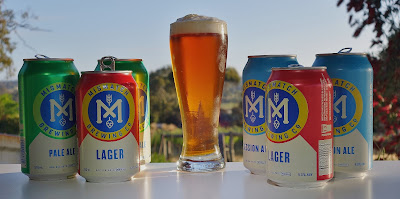by PHILIP WHITE
As the craft beer business gradually eats into the empires of the world's biggest brewers, the fashion is for anybody with a shed or a beard to suddenly presume the status of brewer and get on brewing suds.
If you don't have a shed or a beard, you probably pay a bigger brewer to make the suds for you and pretend you did it yourself.
If you're any good at either of the above, one of those leviathan transnational sudsters might buy you out and pay you to hang around so it looks like you are still the boss and the product remains worthy of the craft appellation. As if.
Critics like me have been a bit twitchy about promoting many of the craftier crafters as their product often quite naturally varies so widely from batch-to-batch that there's no guarantee my reader will get the same product as the one I taste.
Which is never to suggest that every beer made in a little shed will be more unstable than one made in a very big one, or even a refinery with no shed.
It wasn't beer, but it was grain: I bought a tin of Gordon's Gin and Tonic at Hungry Dan's the other day for thirst reasons and the damned thing was buggered by trichloranisole, the corrupting compound in many corks that makes wine horrid. People don't know what it is but simply don't go there again. Bacchus wouldn't even know how enormous that G&T batch is, or how a bitter compound that arises from chlorine's infuence on certain moulds could get into a tin of gin. Its maker, Diageo, was the world's biggest spirit company until the Chinese Moutai overtook them one deep headache ago.
My point being that the size of the factory doesn't necessarily determine a product's quality or consistency.
Another trouble is hops. Too many of these aspirant or emergent shedsters are so much in love with this overwhelming, bittering, preservative herb that they simply shovel it in like a fat kid shovels Milo into milk.
Beer might smell and taste of hops, but hops don't taste much like beer.
Which leads me to the three canned beers from the Adelaide Hills based Mismatch Brewing Company, which is driven by the beard-free Ewan Brewerton. Brewerton. Fair dinkum.
Mismatch Session Ale ($25 six-pack 375ml cans; 4% alcohol) is the most overtly hoppy of the trio. It is also the lowest in alcohol. It seems designed to cure spring and summer thirst. Friggin works. While the aroma is stacked with Citra and Galaxy hops there's a comforting fruity underlay whose citrus esters meld perfectly with the Citra hops. Then the malt rises, gentle and reassuring.
Take a schlück, and the hops ease off, letting those fruity esters and the malt give you a feeling that you'd usually find only in a stronger brew. It's mouth-filling and as clean as a whistle, finishing as dry as a chip. Or a hop flower. Brilliant. More, please.
Mismatch Lager ($20 six-pack 330ml cans; 4.5% alcohol) uses Hallertau hops and a yeast strain also from Germany, from Weihenstephan, the world's oldest brewery.
It's lagered, or aged before canning, so its components swell and mellow, and homogenise better.
This is a very fine beer, smelling of spring meadow flowers like fresh everlastings and a whiff of dusty country as much as hops. It's smooth and creamy like buttery pears below that polite Hallertau edge.
As a drink, jee whizz. This is up there more than out there: fine, polished and elegant, yet full of healthy, malty, bready, fleshy flavour. It's one of those polished beers that brings no idea of alcoholic strength, and is more immediately satisfying and filling - you don't seem to need so much of it. Brilliant.
Not so much, please. Oops. Correction: more, but not so fast, please.
Mismatch Pale Ale ($25 six-pack 375ml cans; 5% alcohol) is a glorious confident luxury from the first whiff.
Rikau, Mosaic and Blanc hops have tied the malts together like the coarse linen my grandmother used to bind and boil her Christmas puddings, and the beer has a certain pudding comfort, rich in citrus rind with shots of nutmeg and cinnamon.
The bouquet is tantalising and seductive, complex yet harmonious; edgy yet cushioned and comforting.
This beer is fluffy in the mouth, seeming to blow past like feather down. Then those brilliantly-cooperative hops move in, changing gears, stretching the length, drying the palate, stirring the appetite and putting a solid savoury basement in the hunger-enhancement sector.
All these beers are accomplished, obviously well-planned and cleverly executed.
Their appearance is exemplary: their fine Belgian lace - left like Plimsoll lines on the emptying glass - should be the envy of many very big famous brewers who'd tend to respond with more flocculant addition rather than care, effort, better-chosen natural ingredients or gastronomic intelligence.
Ewan Brewerton's choice of hops, grains and yeasts from right around both Old and New Worlds is very cool indeed.
After being a nomadic shedster for years, using corners of other folks' establishments to make his beers, he's happy to have state government assistance to build a proper new brewery near Nairne, in conjunction with the Hills Cider Company, Adelaide Hills Distillery, and Ashton Valley Fresh fruit juices.
I wish him the grand luck he deserves.
And I'm sure a few new thirsty connoisseurs would be an encouragement to such a big brave step. This is real good beer. You can also get it in big cans: 50 litre kegs. Check it out.
Femmes buvant de la biere (detail) - d'Edouard Manet 1878















No comments:
Post a Comment